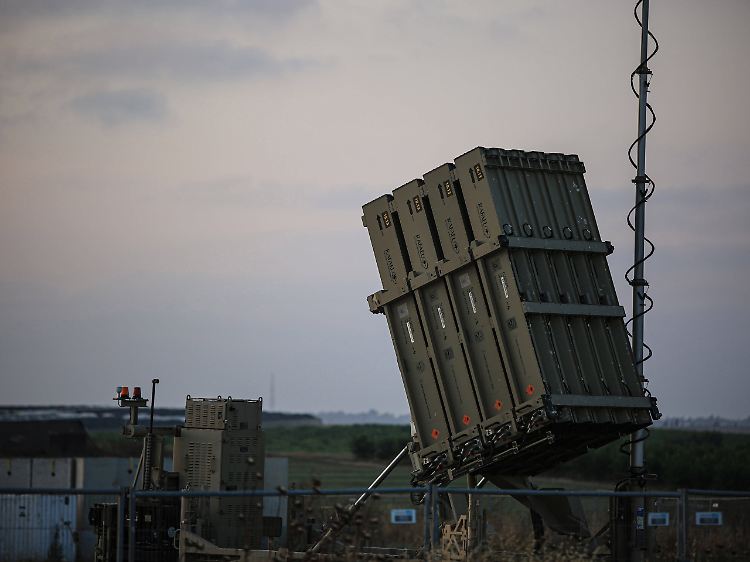According to Israeli reports, Hamas has fired 8,000 rockets at Israel since the war began. As a rule, they are intercepted by the Iron Dome missile defense system. The government can only cover the costs of this with billions in financial injections from its most important ally.
No getting through. This is what the name of the Israeli defense system Iron Dome suggests. The world’s most advanced missile defense system is supposed to protect Israelis from attacks from the Gaza Strip. But the brutal Hamas attack on October 7th put the system to a severe test. In doing so, the Israeli government is paying a lot for its security.

According to Israeli information, around 8,000 rockets have been fired at Israel from the Gaza Strip since the war began. As a rule, the Israeli Iron Dome missile defense system intercepts them
(Photo: IMAGO/Saeed Qaq)
The US think tank Center for Strategic International Studies estimates that producing a single Iron Dome battery costs around $100 million. Israel is currently said to have at least ten units of military technology in use. In addition, each rocket that takes the system out of the sky is estimated to cost around $40,000.
In order to keep costs from rising immeasurably, the military technology has a special feature: the missile defense system can distinguish between settlements and uninhabited areas. If the Iron Dome calculates that a projectile will hit the desert, for example, it will not fire it.
Interception rate of around 90 percent
This feature may have saved Israel a few dollars, especially on the first day of the attack: Hamas claims to have fired 5,000 rockets towards Israel on October 7th. According to the Israeli army, there were only 2,200. According to Israeli government spokeswoman Tal Heinrich, a total of around 8,000 rockets have been fired at Israel since the start of the war.
The “Iron Dome” is the main means of defense for defending against enemy rockets, artillery and mortar shells. The mobile, ground-based system has been in use since 2011 to protect the Israeli population. According to official information, the interception rate of missiles with a range between 4 and 70 kilometers is estimated at around 90 percent. One system can protect around 150 square meters and detect up to six floors at the same time.
An Iron Dome unit consists of three components: a radar system, a control center and several starting batteries for the interceptor missiles. The system only needs a few seconds to assess whether missiles pose a danger. Because military technology is mobile, it can not only react spontaneously to current threat situations. This also makes it more difficult for the enemy to determine the exact location.
USA supports Israel with billions of dollars
The Iron Dome was originally built by the Israeli state-owned defense company Rafael Advanced Defense Systems Ltd. and Israel Aerospace Industries (IAI). In 2011, Israel’s closest ally, the United States, began supporting the program financially. In March 2014, Israel signed a co-production agreement with the United States, allowing components to be manufactured in the United States and increasing access to Iron Dome technology.
Since then, the US company Raytheon has been producing components for the interceptors. American support for the system is part of a larger package of U.S. military aid to Israel, which will total $38 billion from 2019 to 2028, according to an agreement between the two countries. The Iron Dome is therefore also seen as a symbol of the USA’s role as Israel’s protective power. Since its founding, Israel has received more than $125 billion (118 billion euros) in military aid from the United States, according to a 2021 US State Department report.
Israeli Finance Minister Bezalel Smotrich estimated the direct costs of the war for Israel at around $246 million per day. In addition, the indirect costs for the economy, which was partially paralyzed by the mass mobilization of military reservists and the massive Palestinian rocket fire, cannot yet be estimated.